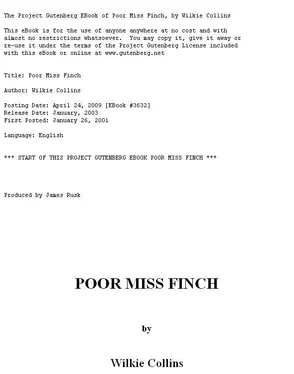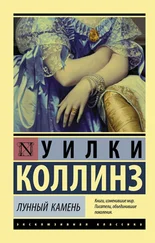Уилки Коллинз - Poor Miss Finch
Здесь есть возможность читать онлайн «Уилки Коллинз - Poor Miss Finch» весь текст электронной книги совершенно бесплатно (целиком полную версию без сокращений). В некоторых случаях можно слушать аудио, скачать через торрент в формате fb2 и присутствует краткое содержание. Год выпуска: 2002, Жанр: Классическая проза, на английском языке. Описание произведения, (предисловие) а так же отзывы посетителей доступны на портале библиотеки ЛибКат.
- Название:Poor Miss Finch
- Автор:
- Жанр:
- Год:2002
- ISBN:нет данных
- Рейтинг книги:3 / 5. Голосов: 1
-
Избранное:Добавить в избранное
- Отзывы:
-
Ваша оценка:
- 60
- 1
- 2
- 3
- 4
- 5
Poor Miss Finch: краткое содержание, описание и аннотация
Предлагаем к чтению аннотацию, описание, краткое содержание или предисловие (зависит от того, что написал сам автор книги «Poor Miss Finch»). Если вы не нашли необходимую информацию о книге — напишите в комментариях, мы постараемся отыскать её.
Poor Miss Finch — читать онлайн бесплатно полную книгу (весь текст) целиком
Ниже представлен текст книги, разбитый по страницам. Система сохранения места последней прочитанной страницы, позволяет с удобством читать онлайн бесплатно книгу «Poor Miss Finch», без необходимости каждый раз заново искать на чём Вы остановились. Поставьте закладку, и сможете в любой момент перейти на страницу, на которой закончили чтение.
Интервал:
Закладка:
Just as I arrived at that sensible resolution, I was recalled to what was going on in the room, by Lucilla's voice, addressing me by my name.
"The likeness is wonderful," she said. "Still, I think I can find a difference between them."
(The only difference between them was in the contrast of complexion and in the contrast of manner—both these being dissimilarities which appealed more or less directly to the eye.)
"What difference do you find?" I asked.
She slowly came towards me, with an anxious perplexed face; pondering as she advanced.
"I can't explain it," she answered—after a long silence.
When Lucilla left him, Nugent rose from his chair. He abruptly—almost roughly—took his brother's hand. He spoke to his brother in a strangely excited, feverish, headlong way.
"My dear fellow, now I have seen her, I congratulate you more heartily than ever. She is charming; she is unique. Oscar! I could almost envy you, if you were anyone else!"
Oscar was radiant with delight. His brother's opinion ranked above all human opinions in his estimation. Before he could say a word in return, Nugent left him as abruptly as he had approached him; walking away by himself to the window—and standing there, looking out.
Lucilla had not heard him. She was still pondering, with the same perplexed face. The likeness between the twins was apparently weighing on her mind—an unsolved problem that vexed and irritated it. Without anything said by me to lead to resuming the subject, she returned obstinately to the assertion that she had just made.
"I tell you again I am sensible of a difference between them," she repeated—"though you don't seem to believe me."
I interpreted this uneasy reiteration as meaning that she was rather trying to convince herself than to convince me. In her blind condition, it was doubly and trebly embarrassing not to know one brother from the other. I understood her unwillingness to acknowledge this—I felt (in her position) how it would have irritated me. She was waiting—impatiently waiting—for me to say something on my side. I am, as you know already, an indiscreet woman. I innocently said one of my rash things.
"I believe whatever you tell me, my dear," I answered. "You can find out a difference between them, I have no doubt. Still, I own I should like to see it put to the proof."
Her color rose. "How?" she asked abruptly.
"Try your touch alternately on both their faces," I suggested, "without knowing beforehand which position they each of them occupy. Make three trials—leaving them to change their places or not, between each trial, just as they please. If you guess which is which correctly three times following, there will be the proof that you can really lay your hand on a difference between them."
Lucilla shrank from accepting the challenge. She drew back a step, and silently shook her head. Nugent, who had overheard me, turned round suddenly from the window, and supported my proposal.
"A capital notion!" he burst out. "Let's try it! You don't object, Oscar—do you?"
" I object?" cried Oscar—amazed at the bare idea of his opposing any assertion of his will to the assertion of his brother's will. "If Lucilla is willing, I say Yes, with all my heart."
The two brothers approached us, arm in arm. Lucilla, very reluctantly, allowed herself to be persuaded into trying the experiment. Two chairs, exactly alike, were placed in front of her. At a sign from Nugent, Oscar silently took the chair on her right. By this arrangement, the hand which she had used in touching Nugent's face, would be now the hand that she would employ in touching Oscar's face. When they were both seated, I announced that we were ready. Lucilla placed her hands on their faces, right and left, without the faintest idea in her mind of the positions which the two relatively occupied.
After first touching them with both hands, and both together, she tried them separately next, beginning with Oscar, and using her right hand only. She left him for Nugent; again using her right hand—then came back to him again—then returned to Nugent—hesitated—-decided—tapped Nugent lightly on the head.
"Oscar!" she said.
Nugent burst out laughing. The laugh told her, before any of us could speak, that she had made a mistake at the first attempt.
"Try again, Lucilla," said Oscar kindly.
"Never!" she answered, angrily stepping back from both of them. "One mystification is enough."
Nugent tried next to persuade her to renew the experiment. She checked him sternly at the first word.
"Do you think if I won't do it for Oscar," she said, "that I would do it for you? You laughed at me. What was there to laugh at? Your brother's features are your features; your brother's hair is your hair; your brother's height is your height. What is there so very ridiculous—with such a resemblance as that—in a poor blind girl like me mistaking you one for the other? I wish to preserve a good opinion of you, for Oscar's sake. Don't turn me into ridicule again—or I shall be forced to think that your brother's good heart is not yours also!"
Nugent and Oscar looked at each other, petrified by this sudden outbreak; Nugent, of the two, being the most completely overwhelmed by it.
I attempted to interfere and put things right. My easy philosophy and my volatile French nature, failed to see any adequate cause for this vehement exhibition of resentment on Lucilla's part. Something in my tone, as I suppose, only added to her irritation. I, in my turn, was checked sternly at the first word. "You proposed it," she said; "You are the most to blame." I hastened to make my apologies (inwardly remarking that the habit of raising a storm in a tea-cup is a growing habit with the rising generation in England). Nugent followed me with more apologies on his side. Oscar supported us with his superior influence. He took Lucilla's hand—kissed it—and whispered something in her ear. The kiss and the whisper acted like a charm. She held out her hand to Nugent, she put her arm round my neck and embraced me, with all her own grace and sweetness. "Forgive me," she said to us gently. "I wish I could learn to be patient. But, oh, Mr. Nugent, it is sometimes so hard to be blind!" I can repeat the words; but I can give no idea of the touching simplicity with which they were spoken—of her innocently earnest anxiety to win her pardon. She so affected Nugent that he too—after a look at Oscar which said, "May I?"—kissed the hand that she offered to him. As his lips touched her, she started. The bright flush which always indicated the sudden rising of a thought in her mind, flew over her face. She unconsciously held Nugent's hand in her own, absorbed in the interest of realizing the new thought. For a moment, she stood, still as a statue, consulting with herself. The moment passed, she dropped Nugent's hand, and turned gaily to me.
"Will you think me very obstinate?" she asked.
"Why, my love?"
"I am not satisfied yet. I want to try again."
"No! no! At any rate not to-day."
"I want to try again," she repeated. "Not in your way. In a way of my own that has just come into my head." She turned to Oscar. "Will you humour me in this?" It is needless to set down Oscar's reply. She turned to Nugent. "Will you?"
"Only say what you wish me to do!" he answered.
"Go with your brother," she said, "to the other end of the room. I know where you are each of you standing, at this end. Madame Pratolungo will lead me to the place, and will put me just within reach of both your hands. I want each of you in turn (arrange by a sign between yourselves which is to begin) to take my hand, and hold it for a moment, and then drop it. I have an idea that I can distinguish between you, in that way—and I want very much to try it."
The brothers went silently to the other end of the room. I led Lucilla, after them, to the place in which they stood. At my suggestion, Nugent was the first to take her hand, as she had requested; to hold it for a moment, and then to drop it.
Читать дальшеИнтервал:
Закладка:
Похожие книги на «Poor Miss Finch»
Представляем Вашему вниманию похожие книги на «Poor Miss Finch» списком для выбора. Мы отобрали схожую по названию и смыслу литературу в надежде предоставить читателям больше вариантов отыскать новые, интересные, ещё непрочитанные произведения.
Обсуждение, отзывы о книге «Poor Miss Finch» и просто собственные мнения читателей. Оставьте ваши комментарии, напишите, что Вы думаете о произведении, его смысле или главных героях. Укажите что конкретно понравилось, а что нет, и почему Вы так считаете.






